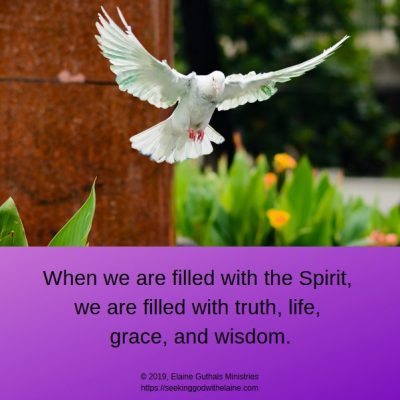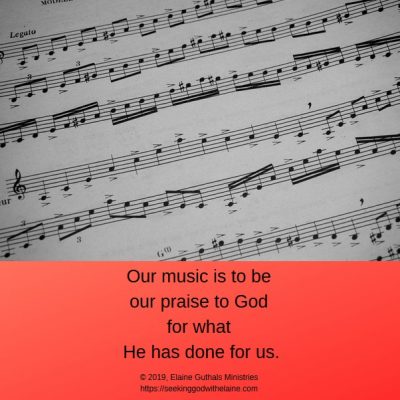Paul had just told the Ephesians not to be foolish. Instead, he wanted them to be wise and worshipful. This devotion looks at this wisdom facilitating our being filled with the Holy Spirit, leading to praise and thankfulness.
Nuggets
- We do not put a wise foot forward when we drink excessively.
- When we begin to follow God, we turn from our sinful ways and walk in the way in which He calls us.
- Our music is to be our praise to God for what He has done for us.
- We have to have a grateful heart.

I wonder if Paul had ADHD. You think he is wrapping up a topic to move on, and no, he backtracks and gives you just a bit more.
I think Paul would throw in things when he thought of them. He wanted to make sure he gave them all the advice they needed. Let’s see what he had to say.
Let's Put It into Context
“Therefore do not be foolish, but understand what the will of the Lord is” (Eph. 5: 17 RSV)
God doesn’t want us to be foolish. He wants us to grow in grace and knowledge (II Pet. 3: 18).
Paul has just given us several verses as to how we can apply all of this knowledge to walk in the way God wants us to walk. When we do this, His light will shine through us.
Excess
“And do not get drunk with wine, for that is debauchery; but be filled with the Spirit” (Eph. 5: 18 RSV)
In What Does It Mean to Deny Ourselves?, we talked about whether or not drinking alcohol itself is a sin. There are several verses that say drinking wine is okay.
To read a related devotion, click the appropriate button below.
However, there are probably just as many verses that call drunkenness a sin. If we look at this verse in the King James Version, debauchery is talking about excess: “And be not drunk with wine, wherein is excess; but be filled with the Spirit” (Eph. 5: 18 KJV).
I don’t want to rehash what we’ve said before, but we learn by taking prior knowledge and evaluating it against new knowledge. So, let’s see what this section will give us.
When we put this in the context of wisdom, we do not put a wise foot forward when we drink excessively. Drunkenness takes away our control.
This can lead to our committing other sins. We may make decisions that we shouldn’t, such as drinking and driving.
Drunkenness can cause us to not “… put on heartfelt compassion, kindness, humility, gentleness, and patience” (Col. 3: 12 HCSB). It can cause us to misplace our filter say things we normally wouldn’t say to others. This can destroy relationships.
We also have to put this in the context of Paul’s audience. He was writing to the saints at Ephesus. We’ve talked several times about the pagan culture of that day, including the worship of the goddess Diana. This would have included drunken orgies.
To read a related devotion, click the appropriate button below.
What had Paul been telling them — and us — for most of the letter? When we begin to follow God, we turn from our sinful ways and walk in the way in which He calls us.
It is really hard to stop doing something that is just a normal part of life and start doing the exact opposite. That is especially true if everyone around is is still doing it. Peer pressure is really hard to withstand.
We have to be filled with the Spirit. We have to be influenced by the Spirit. We have to walk in the way God calls us.
When we are filled with the Spirit, we are filled with truth, life, grace, and wisdom. The Spirit is able to reveal to us what we need to know. He is able to comfort us when needed.

Role of Music
“addressing one another in psalms and hymns and spiritual songs, singing and making melody to the Lord with all your heart” (Eph. 5: 19 RSV)
It has been said that singing is the language of the heart. I can agree with that. When you get a song with a great melody and touching lyrics performed beautifully, it can really speak to us.
Paul talked about three types of songs. When we hear the word psalms, we generally think about the ones that David and others wrote that make up the book. These were used in worship services. Scriptures also contain songs called hymns that were written by others, like Moses (Ex. 15) and Hezekiah (II Chron. 29: 30). There are also spiritual songs.
I think it is interesting that Paul is saying here that the music should be unifying. I don’t know if it is as big of an issue as it was a couple of years ago, but the hymn/contemporary issue was causing dissension in many churches.
I can see both sides. I grew up on the old hymns. There is a lot of biblical truths in many of them.
Now that almost everyone has a radio, I can see singing songs that are potentially heard daily. Especially if we aren’t musically inclined, herding the songs throughout the week helps us learn them.
Congregations are going to have proponents in both camps. One isn’t wrong; one isn’t necessarily right.
What we have to be is unified in deciding what music is best for our congregation. We have to make sure decisions are made with “… heartfelt compassion, kindness, humility, gentleness, and patience” (Col. 3: 12 HCSB).
I bet Paul would say that the tune, tempo, and style isn’t what is the most important aspect. What is important is “… singing and making melody to the Lord with all your heart” (Eph. 5: 18 RSV emphasis added)
Our music is to be our praise to God for what He has done for us. We are to worship Him and thank Him.

Giving Thanks
“always and for everything giving thanks in the name of our Lord Jesus Christ to God the Father” (Eph. 5: 20 RSV)
Okay, I would put this under job duty #3. Giving thanks — praising God — would bring Him glory.
The Disciple’s Job Description
Complete Job Description
Individual Description
Job Duty #3
Bring Him Glory (Matthew 5: 16)
We have to have a grateful heart. From that heart, the music is to flow.
Did you see that? “always and for everything …” (Eph. 5: 20 RSV). Not just when things are going right. Not just when we want something. Always. For everything — the good and the bad; the big things and the little things.
We give thanks to God through the name of Jesus. We give thanks through Jesus because He is our Mediator. “For there is one God, and there is one mediator between God and men, the man Christ Jesus” (I Tim. 2: 5 ESV).
Jesus is not only our Mediator, but He also intercedes for us. “Who is the one who condemns? Christ Jesus is the One who died, but even more, has been raised; He also is at the right hand of God and intercedes for us” (Rom 8: 34 HCSB).
This ties into something else we’ve talked about. God wants us to remember. He wants us to look back at all the times He has helped us through situations that were impossible for us but possible for Him (Mt. 19: 26). He wants us to make the connections, so we grow in knowledge. He wants us to look back and see what we couldn’t see in the heat of the moment.
Let’s look at it this way. We wouldn’t even be able to approach God if Jesus hadn’t paid the price for our sins. We had this broken relationship with God that He fixed without our even asking (Gen. 3: 15).
My Ladies and I were talking about that Sunday. God designed the plan of salvation before Adam and Eve has even bit — before they were even created. Why didn’t He just make it so they wouldn’t sin? Why would He out all of us through this?
Love.
God could have probably talked until He was blue in the face telling us He loved us. Until His actions proved His words, we probably wouldn’t believe Him.
So, God showed us.
Making the Connections
Let’s go back and talk about not going along with the crowd, especially when we used to do that. (Okay, did I pull a Paul? Deal with it.)
As much as individuality is championed these days, we really don’t like being lone rangers. We don’t want to stand out from others. Plus, we don’t want to go outside of accepted norms.
Disciples of Jesus are starting to get outside of accepted norms. We are going to need to remain filled with the Spirit to remain strong when we are going against society.
How Do We Apply This?
How should we remain filled with the Spirit? We need to work on our relationship. That means we have to continue to seek God.
Searching for and Seeking God
Hearing His Word (Rom. 10: 17 NLT).
Reading His Word (Rev. 1: 3 ESV).
Praying to Him (Heb. 4: 16 ESV).
Studying His Word (Ac. 17: 11 NLT).
Meditating on His Word (Ps. 1: 1-2).
Memorizing His Word (Ps. 119: 11 NLT).
To read Has God Provided Everything We Need?, click the button below.
But it means more than that, too. We get to be filled with the Holy Spirit! That should make us sing. Our praises should be raising the rafters.
That should mean we want to give God even more control of our lives. We want to walk even closer to Him and live exactly the way He wants us live. It means we should want even more to do the do’s and not do the don’ts. We should want excess of Him.
Father. Accept our praise. Fill us with Your Spirit. May ur songs of joy be beautiful in Your ears. Amen.
What do you think?
Leave me a comment below (about this or anything else) or head over to my Facebook group for some interactive discussion.
If you don’t understand something and would like further clarification, please contact me.
If you have not signed up for the email daily or weekly providing the link to the devotions and the newsletter, do so below.
If God has used this devotion to speak with you, consider sharing it on social media.
Q: Speak some to the tension between being a missional community and working for systemic change. How can you be in deep friendship with people on the margins and help them in their current situation, and also work and advocate for changing the systems that put them in this position?
This is a great question. Let me process some and get back with you. I want to make sure what I say is thought out and coherent. Elaine
Look at today’s devotion for the answer to your question.
Pingback: When Should We Meditate? – Seeking God with Elaine